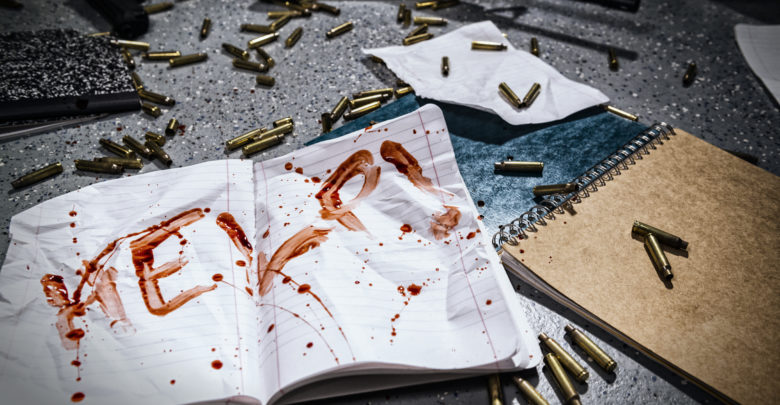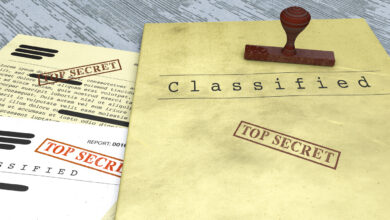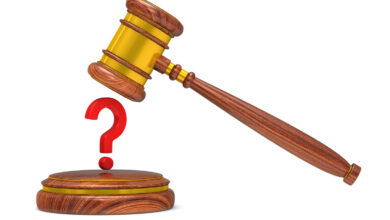Guns and Mental Illness

The epidemic of mass shootings in the United States raises difficult, thorny questions about the connection between gun violence and mental illness.
With hindsight, it is easy to assign deviant behavioral pathology to each of the long list of mass shooters. Some are angry obsessives. Some are super-partisan political fanatics. Some are alienated loners looking for a cause. Some are just lost, deluded souls.
Ian Long, the former Marine machine-gunner who mowed down college students in a crowded bar in Thousand Oaks, has been described as a “ticking time bomb” with serious anger-management problems, likely suffering from Post-Traumatic Stress Disorder. Robert Bowers, a raging anti-Semite, gunned down 11 people in a synagogue in Pittsburgh in the deluded belief that the Hebrew Immigrant Aid Society was bringing in “invaders” to “kill our people.”
Everybody (well, almost everybody) believes that it would be good to find a way to keep guns out of the hands of dangerous people like Long and Bowers.
Easier said than done.
There is no way to enact legislation that will effectively keep deadly weapons out of the hands of dangerously unstable individuals without restricting the rights of millions of other mentally ill persons who pose no serious risk to society.
The current law doesn’t even come close. The Brady Bill requires federally licensed gun dealers to conduct background checks to screen out individuals who have been “adjudicated as a mental defective or committed to a mental institution.” Even if perfectly implemented, this narrow screen would not have prevented a single one of the mass shooters from legally obtaining guns.
Extending that background check requirement to gun shows and private sales would do almost nothing to prevent dangerously unstable people who have no criminal record from acquiring deadly weapons. The number of people who have been “adjudicated as a mental defective” is infinitesimal compared to the population of people suffering some form of mental illness, and a society that is concerned with individual freedom rightly makes it extraordinarily difficult to involuntarily commit anybody to a mental institution.
In order to be at all effective, the law would have to restrict sales to a much broader group of people than those who have been adjudicated as a “mental defective” or committed to a mental institution. It would somehow have to reach people like Long, or Bowers, or Cesar Sayoc, the accused MAGA pipe bomber.
Good luck with that.
Try drafting a law that effectively keeps guns out of the hands of those individuals and others like them without restricting the rights of millions of other people who pose no risk to society.
How, exactly, are the “dangerous” people going to be defined? Who is going to decide which of the 45 million adult Americans who suffer from some mental illness are so dangerous that their rights should be restricted? What kind of due process will be applied to the decision? How do you tell a lethally dangerous anti-Semite from a merely stupid bigot? Are you going to subject all Iraq and Afghanistan veterans to a mandatory screening process to determine which of them might snap? Who’s going to make that decision, based on what criteria? Don’t the mentally ill have rights, too?
Any attempt to broadly restrict the rights of the mentally ill would meet justifiable, immovable resistance not only from public health advocates, but from all quarters, including the National Rifle Association.
In perhaps its only sensible policy position, the NRA declares that “a person cannot be federally disqualified from owning a gun based simply on a psychiatrist’s diagnosis, a doctor’s referral, or the opinion of a law enforcement officer, let alone based on getting a drug prescription or seeking mental health treatment. Doing so would actually discourage troubled people from getting the help they need.”
True that.
If it isn’t possible to draft a workable, constitutional law that would narrowly target and disqualify only truly dangerous people, what’s the answer?
Never short on answers, the NRA offers a cheery, if ludicrous, solution to what it calls “the problem of mental illness and violence.”
Let’s cure our way out of it! Let’s “seek means by which society can identify, treat and temporarily isolate such individuals!”
Well all-righty! Let’s wave our magic wand and cure all the mentally ill people! And until they’re all cured, all we need to do is “identify” and “isolate” them!
Really, doesn’t the NRA at least have somebody who looks at their statements to “identify” and “isolate” those that are too stupid to utter in public?
What, then, is the answer?
This isn’t rocket science. There are only two moving parts: (1) the guns, and (2) the people who use them. If there’s no effective, legal way to identify and disqualify people who have the potential to become mass killers (without running afoul of due process and deeply held American values) then there’s only one option left.
Control the guns.
That, too, is a complicated task, fraught with constitutional red lines and clashing values.
Like it or not, the Supreme Court’s 2008 ruling in District of Columbia v. Heller that the Second Amendment protects an individual’s right to possess a firearm is the law of the land. Given the current composition of the Court, that’s not going to change any time in the foreseeable future.
That means that no law broadly banning gun ownership will withstand judicial scrutiny.
But that doesn’t end the discussion. Even Justice Scalia, the author of the Court’s opinion in Heller, recognized that the right secured by the Second Amendment is not an unlimited right “to keep and carry any weapon whatsoever in any manner whatsoever and for whatever purpose.”
Justice Scalia made it clear that nothing in the Heller decision should cast doubt on laws forbidding the carrying of firearms in sensitive places, imposing “conditions and qualifications” on the commercial sale of arms, or banning certain kinds of “dangerous and unusual weapons.”
Absent a constitutional amendment revising the Second Amendment, or a major shift in the composition of the Supreme Court, that is the most promising battleground on which the fight can be fought, at least in the near term.
If we can’t keep all guns out of the hands of dangerous people, maybe we can at least keep the most lethal assault weapons out of their hands by making it illegal for anybody to purchase them. Maybe we can prohibit carrying firearms in all kinds of sensitive, vulnerable public places. Maybe we can raise the minimum age to buy guns. Maybe we can ban bump stocks and other attachments that make it easy to convert a semi-automatic weapon into an automatic weapon. Maybe we can do much more.
In other words, even if we can’t stop potentially dangerous people from buying guns altogether, maybe we can limit the carnage they can wreak at any given time or place.
In order to get there, though, first we have to put the lie to the NRA’s core talking point that mass shootings are “a mental illness problem, not a gun problem.”
No. There’s no reason to believe that there is a higher percentage of mentally ill people in the United States than anywhere else in the world, yet no other civilized country is as awash in guns as we are, or has a gun violence problem approaching the magnitude of ours.
Gun violence is a gun problem, not a mental illness problem.





Philip,
You latched on to an insoluble problem and exactly described why it is, in fact, unsolvable in America–although you do not directly conclude this. Yes, guns are the problem. This mental illness frame-up is a mindless (pardon this reference under the circumstances) canard. The government could ban every suspected (forget clinically diagnosed) deranged person from owning weapons and it would not make an iota of difference to the slaughter rate we endure. Most murderers are not in fact mentally ill–nor are most mass murderers.
The militia gun ownership part of the second amendment probably was judicially interpreted correctly. (This strict constructionist/originalist interpretation garbage fails us badly where the 2nd is concerned.) Scalia’s Heller opinion is also correct, although almost useless in practice. Most states, including my own, already sensibly deny me the right to carry my concealed weapon in certain specified places. Even as an owner of multiple rifles pistols and shotguns for some 50 years, the 2nd is the only amendment I would like to see rescinded and perhaps replaced with appropriate contemporary provisions for ownership..
Furthermore, what to me are humorously called assault weapons, such as my own AR-15s, are nothing more than regular semi-automatic rifles–with one senseless exception. My AR comes with 30-round magazines. Hell, my Beretta 9mm pistol comes with 15-round magazines. And I can carry as many of these magazines as I can pack around. Why would anyone need such a volume of ammunition? Even my little .22 caliber rifle comes with 10-round magazines. And believe me, a .22 is often as lethal as larger calibers if people are the intended targets. Nobody would identify this rifle as an assault weapon even though I can fire it as fast or even faster than than my ARs.
Nevertheless, banning new high-volume magazines also would solve nothing since there are about a billion of them available on the open market. Maybe banning factory ammo? Nope, there are trillions of used ammo casings that anyone can reload. Powder? Lead? Steel? Ban these? I think not.
Restrictive options as those I listed are numerous on end; with each as useless as the the former or the next one. Sadly, there are no effective, legally permissible answers for America.
Not many things are now or have ever been insoluble for Americans. I contend this is one though.
I hate to think this is insoluble, but you may be right, or very close to it. Still, while I don’t really have standing to argue with an experienced, thoughtful gun-owner like you, I do believe that banning the most deadly assault weapons, or whatever you want to call them, might have at least some positive benefit. While somebody as skilled as you might be able to fire your .22 as fast as an AR, I doubt that applies to your garden variety mass shooter. Put differently, I’m guessing that you and I both would be a little less intimidated (though definitely not happy!) to see someone walk into a crowded theater with a .22 than with an AR. But I get your point.